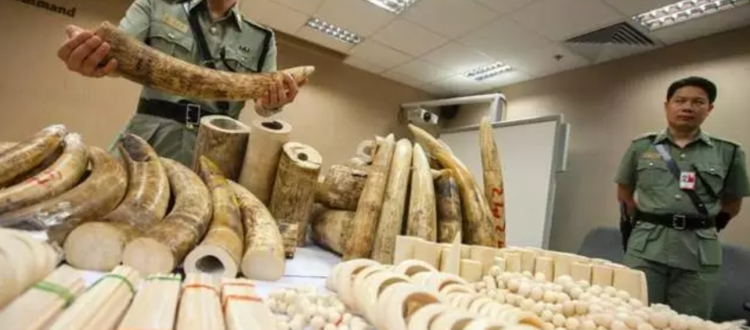Chinese Ivory Trade Ban: More Than Putting Legal Sale Out of Business
BEIJING (Apr. 3, 2017) – Elephant lovers and environmentalists around the world rejoiced on December 30, 2016, when the Chinese State Council announced the official timeline for closing commercial processing and sales of ivory.
Actively ending China’s domestic legal ivory market not only demonstrates the Chinese government’s determination to combat elephant poaching but also positions the country as an international leader in elephant conservation.

While the applause and cheers from the international community are still echoing in our ears, we are entering the beginning of the crackdown on ivory. In fact, on March 24th, the State Forestry Administration released a schedule showing that 12 ivory carving factories and 55 retail outlets will be closed on March 31.
So, it seems that everything is on track – but even if all legal ivory carving factories and sale stores are closed, can we guarantee the survival of African elephants?
Actually, the truth behind the scenes is beyond your imagination.
Closing Legal Business Is Just the Beginning
The first issue these legal factories and stores have to deal with after end of March is: how to handle the remaining raw ivory and products.
From April 1, these legal ivory stockpiles are no longer eligible for sale and so the cost of purchasing and processing ivory is not recoverable. As a result, there’s great potential for capital turnover issue, with insufficient capital further jeopardizing the progress of enterprise transformation and staff resettlement. This same issue is likely to arise when the legal ivory industry closes business at end of this year.

New Complications
Then what can we do? We can’t just simply shrug and say, “Oh well, that’s their business.”
If the legal ivory stockpile is not well managed after the ban is imposed, China’s ivory ban would be nothing more than a piece of paper with empty words. If the government agencies have no intention to buy back the stockpiles from legal industry and ignore the capital turnover issue, the desperate ivory industry might illegally sell stockpile to the black market after the ban.

Did you know that illegal ivory trade in China is often conducted through social media platforms or chat-room by invitation? This is already a big challenge to law enforcement and this struggle is only likely to increase if the legal stockpile leaks to the black market. Besides the black market, the legal ivory stockpile might come to market through other channels.
Currently, the majority of ivory carvings are made from either elephant or mammoth ivory. Without proper training, it’s difficult for inexperienced buyers or enforcement officers to distinguish between elephant or mammoth, and therefore, opens up yet another channel for illicit sales.
Another Way Around
If the government agencies wish to ensure the effectiveness of ivory trade ban but do not want to provide any financial compensation to ivory industry, there is a potential way forward.
In fact, by having a comprehensive stockpile management regulation for inventory verification, storage, and inspection ready by end of 2017 and then implementing it thoroughly after ban, it may be possible to close the potential loophole before complications manifest.

